EU Summit: Support to Croatia for the Euro, Ukraine and Moldova's Candidate Status
BRUSSELS, 22 June - The leaders of the EU member states will gather on Thursday and Friday at a summit to support the recommendation on Croatia's entry into the euro area and to decide on the candidate status for Ukraine, Moldova and Georgia.
The European Council welcomes Croatia's fulfilment of all the convergence criteria set out in the Treaty. It supports the Commission's proposal that Croatia adopts the euro on 1 January 2023 and calls on the Council to swiftly adopt the relevant Commission proposals, a draft conclusion said.
This is the second-last step in the decision-making process on Croatia's accession to the euro area. The last step will be the adoption of three legislative proposals on Croatia's entry, which will take place at a meeting of the Economy and Finance Council on 12 July.
The main topic of the summit is enlargement, and giving candidate status to Ukraine and Moldova, while Georgia should receive a promise of its European perspective, which roughly corresponds to the status of a potential candidate.
So far, there are no indications that anyone will oppose candidate status for Ukraine and Moldova.
Western Balkans
EU leaders will also discuss the Western Balkans and reiterate their full and unequivocal commitment to the membership prospects of the countries in the region and call for speeding up the accession process.
Ahead of the EU summit, a meeting of EU leaders with their counterparts from the Western Balkans will take place on Thursday morning.
Three member states are asking for Bosnia and Herzegovina to be granted candidate status, but I do not see a consensus on that, said a senior EU official, well versed in the summit's preparations.
The same source says that in 2019, the Commission published an opinion on the candidacy of Bosnia and Herzegovina with 14 key priorities that the state should meet in order to obtain candidate status.
But since then we have not seen any reforms or any progress in BiH, the source said.
They underscored that European Council President Charles Michel recently received the leaders of the parliamentary parties from BiH, who agreed on a text entitled "Political Agreement on Principles for Ensuring a Functional Bosnia and Herzegovina Advancing on the European Path."
A senior diplomatic source said that the text was not acceptable to two parties from Republika Srpska and that one other party leader did not come for reasons for which I still have no explanation.
HDZ BiH President Dragan Čović did not appear at the meeting of party leaders and members of the BiH presidency.
Recently, the French presidency has been trying to resolve the issue of Bulgaria's blockade by opening talks with North Macedonia. It is still unclear whether these efforts will bear fruit. The Bulgarian parliament will take a vote of no confidence in Kiril Petkov's government on Thursday morning.
Bulgaria demanded that issues related to the common history, language and national identities be included in the negotiating framework for North Macedonia as a precondition for removing the blockades.
Given the great pressure by larger EU member states, particularly in light of the Russian aggression on Ukraine, there have been some indications from Sofia that it could make some concessions, which is why the government is experiencing internal problems.
EU Enlargement Commissioner Oliver Varhelyi on Wednesday thanked the main opposition party's leader, former Prime Minister Boyko Borisov, for "making necessary proposals to the parliament today so Europe can move forward."
European (geo) political community
As part of the "Wider Europe" debate, leaders will discuss the EU's relations with partners in Europe.
Earlier last month, French President Emmanuel Macron called for the creation of a "European political community" to boost EU cooperation with other European countries as those countries' EU accession is not realistic in the near future.
Shortly afterwards, Charles Michel, proposed the creation of a European geopolitical community and the gradual involvement of the Western Balkan countries in certain EU sectoral policies, in line with their progress in the accession process.
Country aspirants fear that this new framework for cooperation could be a substitute for full membership.
The draft conclusions explicitly state that such a framework will not replace existing EU policies and instruments, in particular enlargement.
In the conclusions on Ukraine, the leaders will once again reiterate their strong support for the country and promise to continue providing economic, military, social, financial and humanitarian assistance.
The summit will also discuss food security, which is threatened by Russia's aggression against Ukraine because millions of tonnes of Ukrainian grain cannot be exported due to the Russian blockade of Black Sea ports.
For more, check out our politics section.
Minister: Croats Among Victors of WW2, Tuđman Proposes 22 June as Holiday
ZAGREB, 22 June - Addressing the central commemoration of Croatia's Anti-Fascist Struggle Day in Brezovica near Sisak on Wednesday, Justice Minister Ivan Malenica said that the Croatians were among the victors at the end of the Second World War.
The Partisan movement brought together many Croatian citizens of different ethnic backgrounds and different religious confessions who were united by their wish to defeat Fascism and ensure peace said Malenica, who attended the event as the government and PM Andrej Plenković's envoy.
"That joint goal was also recognised by the first Croatian president, Franjo Tuđman, who himself was a member of the resistance movement (in the 1941-1945 war) and in 1991 he proposed that 22 June should be observed as a national public holiday," said Malenica.
Croatia observes 22 June as a national public holiday in memory of 22 June 1941 when the first Partisan detachment and the first anti-Fascist unit in this part of Europe was founded near Sisak.
Tuđman's efforts to define the fundamental elements of the Constitution of the Republic of Croatia also sent a clear message that anti-Fascism is part of our identity and the history of the Croatian people, which is inbuilt in our statehood, said Malenica.
Accepting both one's own good and bad things in the past is a sign of the maturity of a nation, the minister added.
Unfortunately, some of the Croats took part in the Ustasha movement and cooperated with Nazis and Fascists who caused unthinkable suffering and left behind consequences we are ashamed of when looking backwards, said Malenica explaining that during the Ustasha-led Independent State of Croatia (NDH), many atrocities were committed against Jews, Roma, Serbs and those Croats who opposed the Ustasha regime.
Commenting on mass murders in the wake of WW2, the minister said that "extrajudicial mass killings and removal of different-minded people cannot be justified with ideals."
"Those crimes cannot be eliminated from collective memory. They cannot be erased from our past. We must speak about that and those crimes must be unequivocally condemned," said Malenica.
For more news about Croatia, click here.
PM Says Croatia Can Expect Decision on Entry Into Schengen in Autumn
ZAGREB, 22 June - Addressing the European Parliament in Brussels on Wednesday, Prime Minister Andrej Plenković said that the Council of the EU would next week send a draft decision on Croatia's admission to the Schengen area on 1 January 2023, and the final decision could be adopted this autumn.
Next week the Council of the EU will send to the European Parliament a formal proposal for Croatia's accession into the Schengen, the Croatian PM told the European Parliament.
The decision on the entry into the Schengen area is adopted unanimously by the Council of the EU, and the procedure also includes the request for the opinion of the EP before a final decision.
Plenković says he hopes that the European Parliament will soon vote on its position on this proposal and that during the Czech presidency of the EU this autumn, the final decision on Croatia's membership of the Schengen zone will be adopted.
Thus, at the start of 2023, Croatia is likely to join both the euro area and the Schengen zone.
For more, check out our politics section.
Croatia to Compete at Mediterranean Games in Oran with 55 Male Athletes, 50 Female Athletes
June 22, 2022 - At the XIX Mediterranean Games in Oran, Algeria (June 25-July 6), Croatia will be represented by 105 athletes in a delegation of a total of 172 people.
Croatia will compete in 17 sports (athletics, badminton, bocce, boxing, gymnastics, wrestling, sailing, judo, karate, 3x3 basketball, fencing, volleyball, swimming, handball, archery, shooting, and taekwondo).
Most Croatia representatives are in volleyball (36), which plays in both competitions with quite strong teams. The Croatia women's handball team will also play in team sports. These two women's teams significantly affected the gender balance of Croatia's competitive delegation, which, with 55 male athletes and 50 female athletes, came close to an almost equal representation.

Croatian colors at the Mediterranean Games will be defended by the Olympic gold medalist from Tokyo Matea Jelić and bronze medalist Toni Kanaet (both from taekwondo), and most of our trump cards (karate, judo, wrestling, boxing) come from martial arts. Silver gymnast Olympian Tin Srbić will also compete in Oran, as well as his representative colleague, currently in excellent shape - Ana Đerek.
Croatia will have exceptionally high hopes in archery, led by Miran Maričić and the Glasnović brothers, and we must not neglect Croatia's bowlers because they brought a gold medal from the last Games (Pero Ćubela and Nives Jelovica), as well as sailors led by Olympian Elena Vorobev.
The result expectations are within the framework of Croatia's overall ranking so far in the competition of 25 Mediterranean countries, and this means a place in the Top 10 rankings of medal winners.
Recall, at the last Mediterranean Games in 2018 in Tarragona (Spain), Croatia's 99 athletes won 17 medals, of which nine were gold, five silver, and three bronze. At the same time, both Croatia national teams in team sports - volleyball and handball - took gold, and Croatia took ninth place in the list of countries that won medals.
For more, make sure to check out our dedicated sports section.
PM Phones Zelenskyy to Convey Croatia's Support to Ukraine's EU Membership Bid
ZAGREB, 22 June - Croatian Prime Minister Andrej Plenković on Tuesday spoke on the phone with Ukrainian President Volodymyr Zelenskyy to express support to Ukraine ahead of the European Union's decision to grant the candidate status to Ukraine.
The European Council will convene for 23-24 June in Brussels to discuss the wider Europe, Ukraine, EU membership applications from Ukraine, the Republic of Moldova and Georgia, economic issues, the Conference on the Future of Europe and external relations.
"Ahead of the meeting of the European Council I spoke on the phone with President Zelenskyy to convey our support to Ukraine in obtaining the status of EU candidate. We grieve the deaths of many innocent victims and we continue providing assistance to Ukraine that is defending its freedom and the values of the whole Europe," the Croatian PM wrote on his Twitter account.
The support to Ukraine's prospective status of candidate for EU membership has already been expressed by the leaders of Germany, France and Italy who together visited Kyiv last week.
While a majority of the EU member-states express the support to the future status of candidate for Ukraine, the Netherlands and Denmark and some other countries seem reserved about those prospects.
The decision on granting candidate status has to be adopted unanimously.
For more, check out our politics section.
81st Anniversary of Foundation of 1st Partisan Unit Marked in Brezovica Forest
ZAGREB, 22 June - Wreath-laying ceremonies were held at the Brezovica Memorial Centre on Wednesday on the occasion of Croatia's Anti-Fascist Struggle Day, observed on 22 June in memory of 22 June 1941 when the first Partisan detachment and the first anti-Fascist unit in this part of Europe were founded near Sisak.
President Zoran Milanović, who laid down carnations in front of the "Debeli Brijest" monument, said in his speech that anti-Fascism had deep roots in Croatia.
"It is a feeling, emotion, it is an integral part of Croatia's journey and one of the segments that make up our roots," said the president who underscored "No to fascism, freedom to the people!", alluding to the "Death to fascism, freedom to the people!" salute used by Tito-led Communist Partisan units in the Second World War.
Milanović said that Croatia's path in WW2 and after that was "just and successful".
Justice Minister Ivan Malenica, who laid a wreath on behalf of the government, said that anti-Fascism is part of the identity and past of the Croatian people, it is deeply intertwined in Croatia's statehood, and accepting both one's own good and bad things in the past is a sign of the maturity of a nation, the minister added.
It is a historical fact that Croatia's nation was among the victors at the end of the Second World War, the Croatian people were among the members of the anti-Fascist coalition, he said.
Sisak Count Prefect Ivan Celjak said that soldiers in the Homeland War made it possible for Croatia to see its dream of independence come true, and the borders of the country were defined by anti-Fascists and the anti-Fascist Struggle in the Second World War
The head of the Alliance of Anti-Fascist Fighters and Anti-Fascists of Croatia (SABA RH), Franjo Habulin, said being anti-Fascist is not a political orientation but a human one.
"Anti-Fascism is alive and never surrenders," he said.
In attendance at the ceremonies were also two former presidents, Stjepan Mesić and Ivo Josipović, Deputy Sabor Speaker Davorko Vidović, Labour Minister Marin Piletić, Supreme Court President Radovan Dobronić, Sisak Mayor Kristina Ikić Baniček, and Zagreb Mayor Tomislav Tomašević.
For more, check out our politics section.
Croatia Ready to Receive Another 60 Irregular Migrants
ZAGREB, 22 June - Croatia has applied for reception and accommodation of another 60 irregular migrants who can be relocated and is one of the few EU member-states that have expressed willingness for welcoming an additional number of migrants.
Irregular migrants should be relocated from Italy, Greece, and Cyprus to other EU member-states, the Večernji List daily recalls.
Apart from Croatia, the other four countries where more migrants can move in are France, Germany, Portugal, and Ireland.
Voluntary applications for welcoming irregular migrants who should be resettled can still be lodgedCroatia also supports France in its broad initiative to reform the asylum-seeking system, says the daily.
During its recent meeting, the EU Homes Affairs Council, under the French presidency, "very broadly supported the first step of the gradual approach to migration and asylum proposed by the presidency, including the screening regulation, the Eurodac regulation, and the solidarity mechanism," according to the information on the French presidency's web site.
A declaration on assisting the countries that bear the brunt of the arrivals of EU-bound irregular migrants and asylum seekers was adopted at the last meeting of EU interior ministers in Luxembourg, says the daily.
During that meeting, the EU countries were offered two options: to take in additional migrants or to provide them with financial assistance.
According to the state of affairs in applications, an estimated 8,000 applications have so far been lodged for taking in migrants. Germany and France are on the top of the ranking with the highest number of applications.
A provisional plan is to ensure the relocation and resettlement of about 10,000 migrants annually.
For more news about Croatia, click here.
Croatia's Coronavirus Update: 834 New Cases, Four Deaths
ZAGREB, 22 June 2022 - In the last 24 hours, there have been 834 new cases of infection with coronavirus, and four more patients have died, Croatia's COVID-19 crisis management team reported on Wednesday.
Currently, there are 2,834 active cases, and 188 patients are receiving hospital treatment, including four patients on ventilators.
The infectious disease has taken 16,039 lives in the country so far.
In the last 24 hours, 140 persons have recovered from the disease.
For everything you need to know about coronavirus specific to Croatia, bookmark our dedicated section and select your preferred language if it isn't English.
Croatian Gymnasts Continue Winning Medals this Season - What's Next?
June 22, 2022 - Croatian gymnasts were brilliant at the recently concluded World Cup in Slovenia, with Ana Đerek winning two new medals (gold and silver) and Mateo Žugec securing gold on the pommel horse. A look at what's next.
Ana Đerek won two new medals at the World Cup in Slovenia! After Varna (gold on the beam and bronze on the floor) and Osijek (silver on the beam and floor), she climbed the podium again. Ana claimed gold on the floor routine and won silver on the beam, continuing an incredible series - the third World Cup in a row this season with two medals each. Or even better, she is thrilled that she won gold twice for the fourth weekend in a row since the Croatian Championship between Varna and Osijek!
The GK Marjan Olympian from Split finished 2nd in Slovenia on the beam, scoring 13,250. Only Hungarian Zsofia Kovacz (13,650) was better, while her compatriot Greta Mayer (12,450) won the bronze. The second Croatian finalist on the beam, Tina Zelčić (ZTD Hrvatski sokol), remained one step closer to the podium, finishing fourth with 11,700 points in her 3rd SK final in her career.
Ana Đerek's silver on the beam was her 18th medal in World Cup tournaments, but only a few moments later, she reached the 19th in her 33rd final, thanks to gold on the floor. She won it with a score of 12,900 and stood on the podium with silver medalist Poppy-Grace Stickler (12,750) and bronze medalist Greta Mayer (12,650). This is Ana's second gold this season after the beam in Varna and the fifth in her career at the World Cup.
"Three World Cups in a row, six medals, and gold and silver. I really couldn't be happier," said Ana after listening to the Croatian national anthem in Slovenia.
"Things happened this time on my own, considering that I made a small mistake at the beginning of the exercise on the floor where I thought that I had dropped out of the fight for gold, but in the end, things turned out so well that even with that one mistake I won gold."
And the beam?
"I did the exercise without falling; I won silver… I am delighted because I haven't been training on the beam very well for the last few days. We haven't found a common language on this beam until today. And the warm-up was bad, so I have no comment. However, my effort and work returned very nice," Ana was grateful.
Mateo Žugec won gold on the pommel horse at the World Cup in Slovenia. The 20-year-old from Varaždin, a member of GK Vindija, won the second medal in his third World Cup final, and in just three weeks, he added gold from Koper to his silver medal from Varna.
Mateo, once the fourth junior in Europe (2020) and the fifth junior in the world (2019), is quickly profiling himself as a great senior who taught a lesson to many more experienced than himself and celebrated with 14,050 points (start 5.6) in the final.
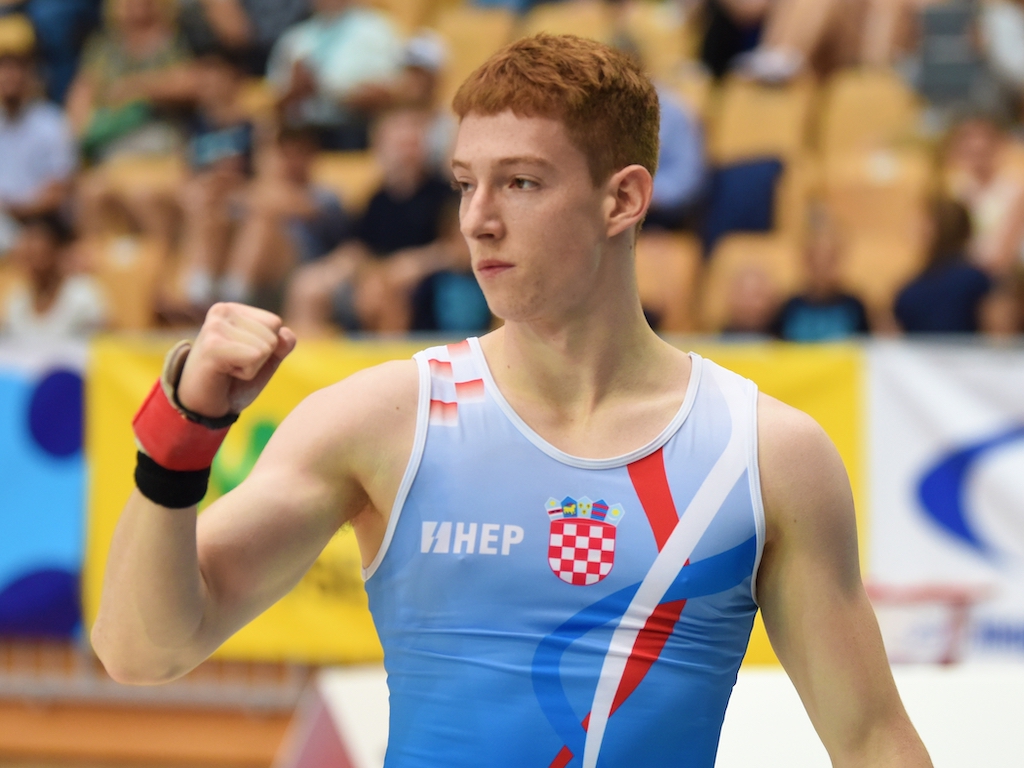
Slobodan Kadic
"I hold this gold medal in my hand and have no words. I can't believe that in only three appearances at the World Cups, I took silver and here, this time gold. I am happy with myself. I hope this will continue at the Mediterranean Games in Algeria, which are now waiting for me. And until then, we are going to celebrate this gold," said Mateo after the final, in which he stood on the podium with the silver medalist Ukrainian Peter Pahnjuk (13,750) and the bronze medalist Hungarian Krisztofer Meszaros (13,200).
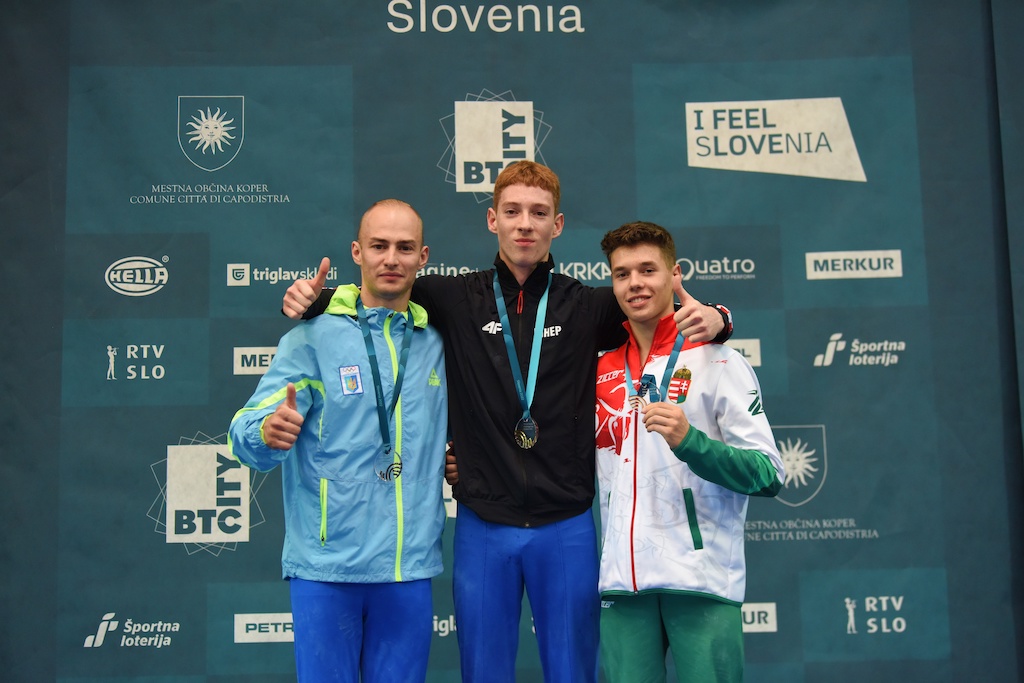
Slobodan Kadic
The Croatia national team is now turning to the Mediterranean Games, where Tin Srbić, Jakov Vlahek, Mateo Žugec, Ana Đerek, and Tijana Korent compete.
For more, make sure to check out our dedicated sports section.
From Zagreb to Split Taking the Magical Old Highway
June 22, 2022 - If you are traveling from Zagreb to Split, or vice versa, you will most likely take highways E71 and E65 to get to your destination as quickly as possible. If you are not in a hurry, the old highway passing through Drniš, Knin, and Lika will surprise you.
I went to Zagreb recently, and contrary to my usual practices, I decided to bet on BlaBlaCar to travel to the Croatian capital. For those not very familiar with this application, you can choose a place of origin and destination and see which drivers (people like you or me) travel the same route and can give you a lift for a fee. I remember that a few hours before I met the driver in Split, she called me to ask if I had to get to Zagreb fast or if we could take the old highway that passed through Drniš. I didn't think much about it, but it was true that I wasn't in a hurry.
I am one of those people who say yes without thinking much, and sometimes that works against me. On this occasion, I want to thank my brain for being that way, since I discovered a way to travel through Croatia that will always remain in my memory, and that I will surely try to repeat more often.
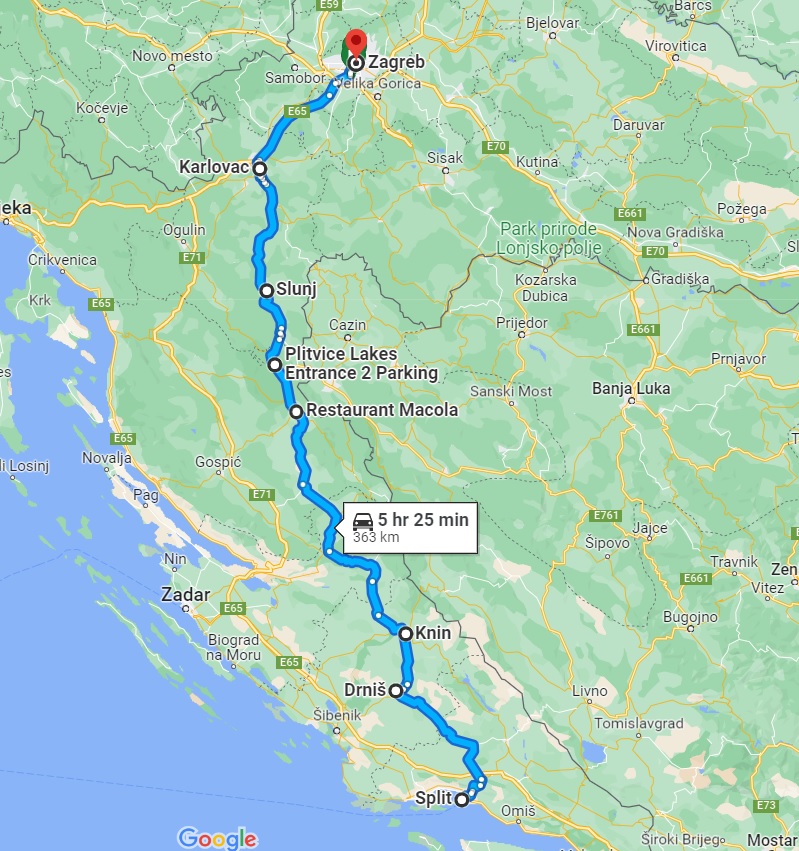
The beginning of the route is quite similar if your plan is to get to Dugopolje to take the E65 highway, only this time you will have to take the highway junction at Klis-Grlo, and you will now be on the D56 road in the direction of Drniš. Unlike the fast highways to Zagreb, this route can take between 5 and 5 hours and thirty minutes by car, almost an hour more. It's worth it? If you really have to get to Zagreb, or to Split, as soon as possible, there is not much I can tell you. But if you have time to spare, there are plenty of things you should consider that will surely encourage you to try something new. I mean, yes. There's nothing like the feeling of speed, but don't you sometimes get bored with your foot on the accelerator at a constant speed watching cars and trucks go by? I'm not saying the views aren't spectacular, because they are. What I'm trying to say is that there comes a point where you're no longer excited or surprised. Sometimes daring helps you discover new places and landscapes.
Here are some of the places you will see along the way:
Drniš
After crossing the picturesque valley behind Klis and crossing into the Sibenik-Knin region, you will find yourself in the village of Drniš, located halfway between the city of Šibenik and Knin. The valleys that anticipate and surround it will make you stop several times to carefully appreciate its beauty. There are many reasons why you should discover Drniš. Because it is a town with a rich tradition of culture and food, not least Croatia's most-distinct prosciutto (Drniš pršut). Additionally, it is the birthplace of Croatia's most famous sculptor, the world-renowned Ivan Meštrović.
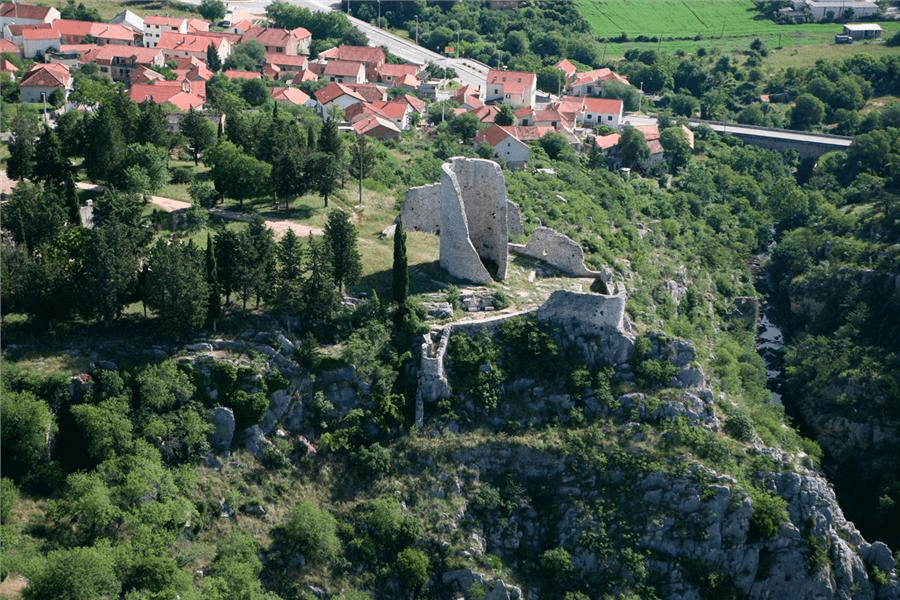
Image: Drniš Tourist Board
Knin
In Drniš, you will change the D56 road to the D33 in the direction of the historic town of Knin, which is almost half an hour away by car. If you start to feel like it's time to grab a coffee, grab a bite to eat, or even go to the bathroom, this is a good time. Personally, I would tell you to hold on a little longer because the next place to visit may be worth the wait. You can also walk through the streets of Knin, full of history that goes back hundreds of years and is mixed with a very recent one.
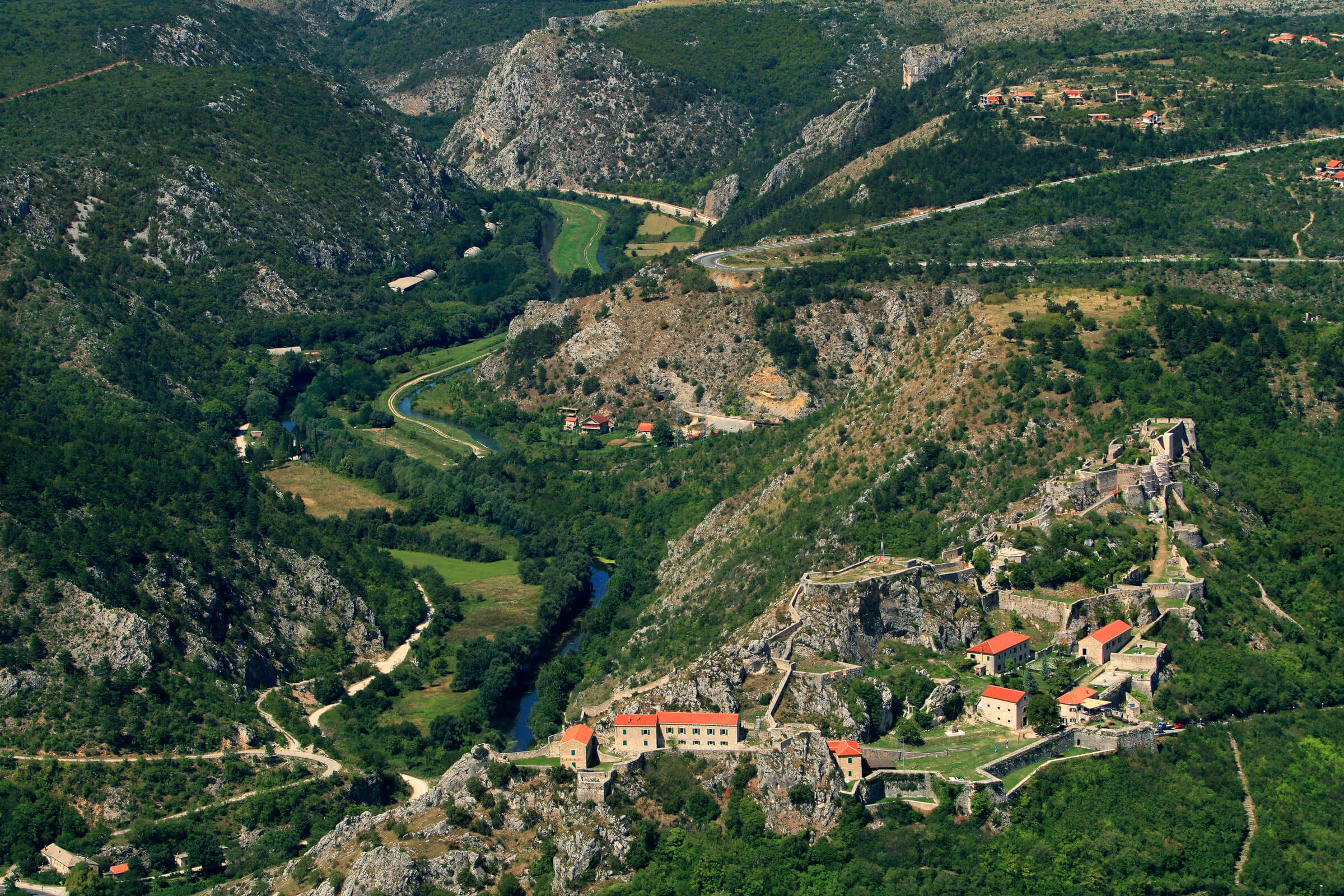
Photo: Mario Romulić
Macola Restaurant
Have you stopped at the Macola restaurant on the E65 highway? If the name doesn't ring a bell, you'll remember it for its stuffed bears and boars inside. It is very likely that you have stopped there on the way to have a coffee or something to eat. Although it is not exactly a destination, you might like to know that the original Macola is located on the D1 road, an hour and a half from Knin, and already in the county of Lika-Senj. Before the E65 existed, this was one of the most popular rest and refreshment points among travelers. My suggestion? A coffee and a walnut or apple strudel are a must.
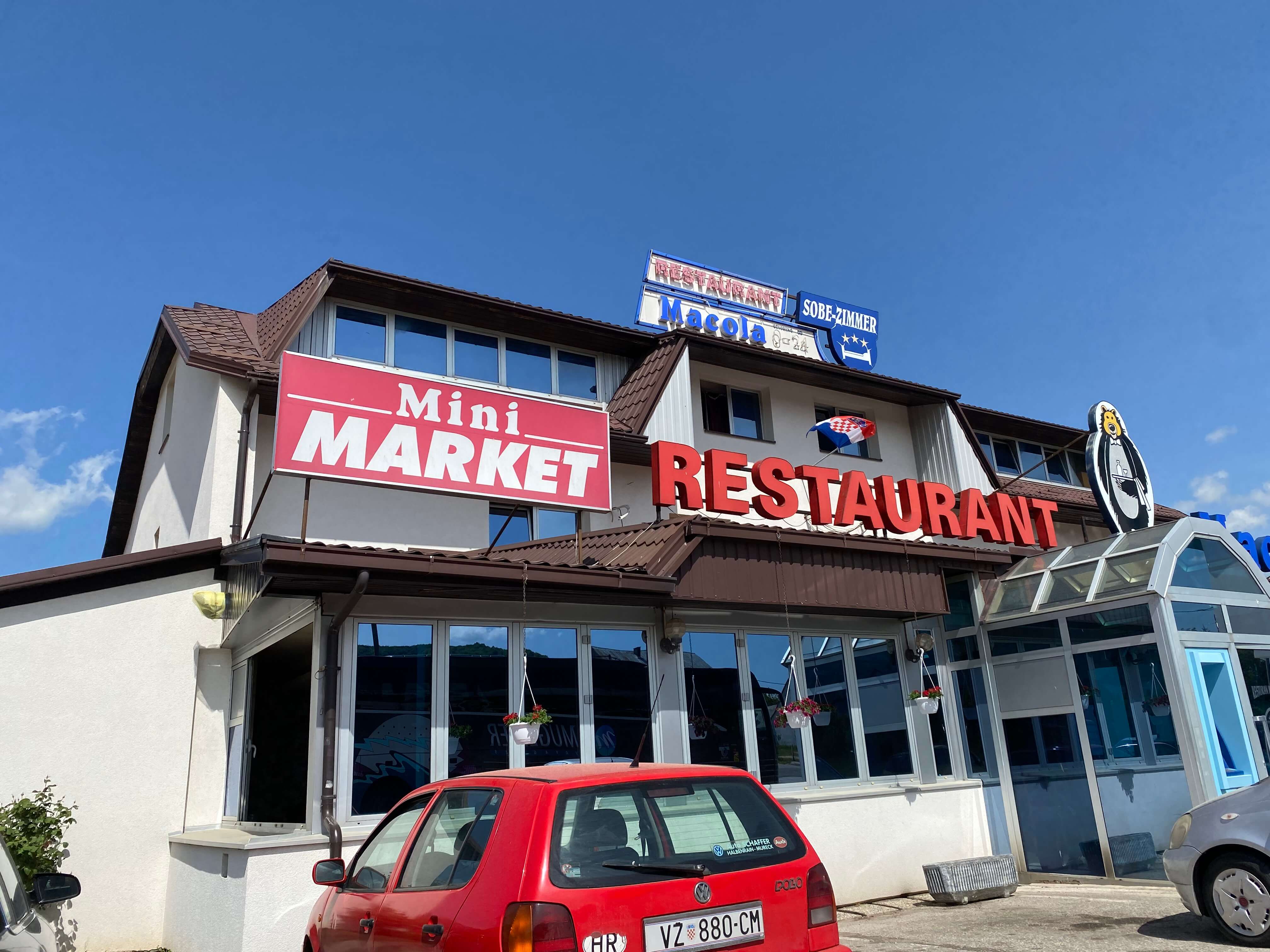
Photo: Jose Alfonso Cussianovich
Plitvice
I know that while you are not in a rush, you also do not have enough time to explore Plitvice Lakes National Park, the largest and oldest national park in Croatia. Perhaps you may find it interesting that two of the entrances to the national park are on the D1 road. You will definitely have to visit the Plitvice Lakes at some point, but for now, you will be able to enjoy the beautiful greenery that accompanies this part of the road, something that you will not be able to see on the E71 highway. If you are interested in visiting the Plitvice Lakes National Park, have you taken a look at the contest that we have organized in collaboration with the Park? You can win two tickets to visit it!
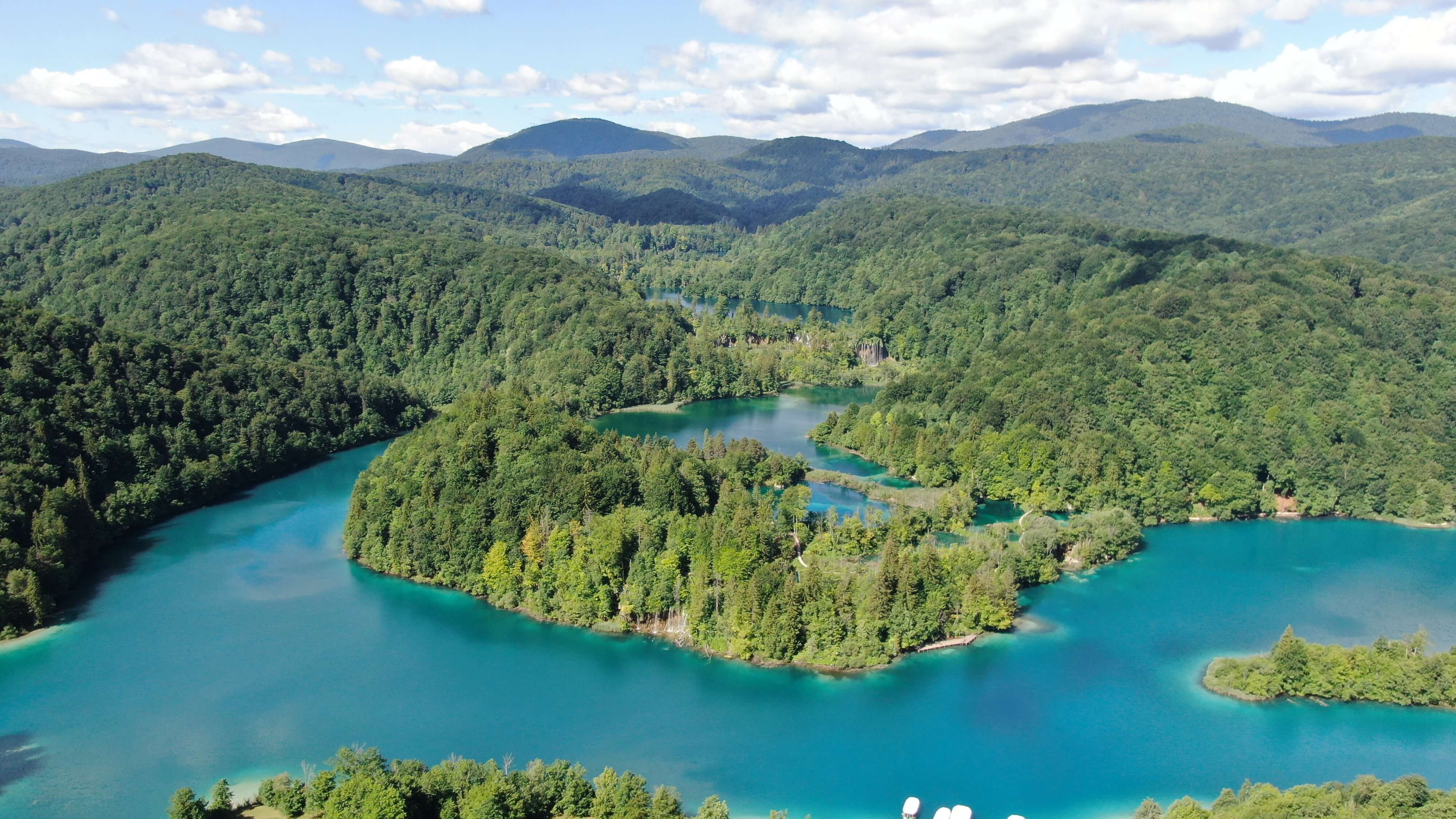
Image: Plitvice Lakes National Park
Slunj
It is difficult to get to Zagreb or Split via the same old motorway, as at some point you will have to return to the fast one either in Karlovac or in Dugopolje. However, that doesn't mean that was all you could see. Be it the first or last of your stops, you have to check out the magical, fairytale town of Slunj. If you have the time, visit it! And if not, from the same road you will be able to see it in the distance and feel that you are going through a location described by J.R.R. Tolkien!
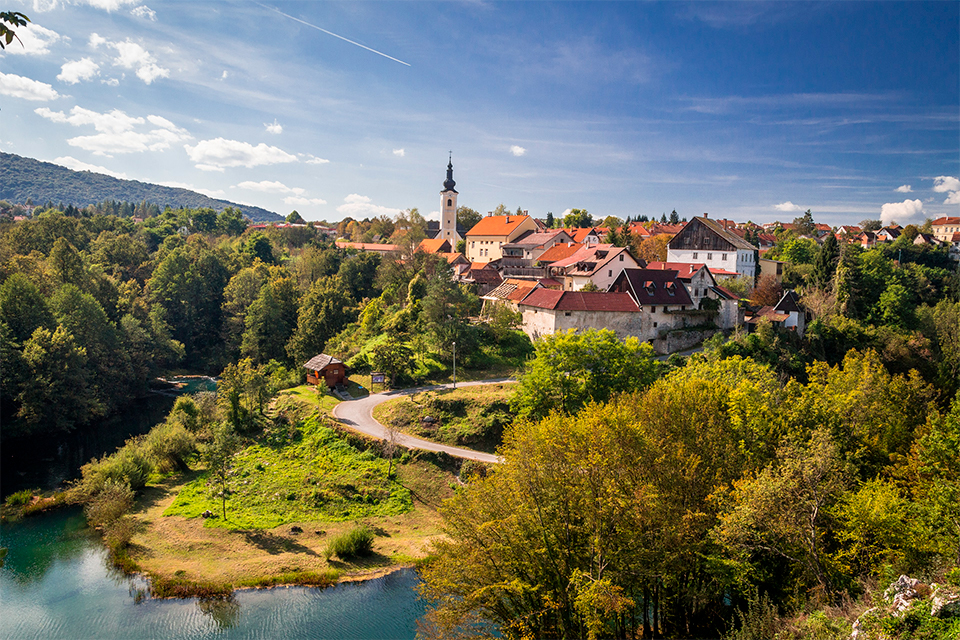
Image: Slunj Tourist Board
For more on travel in Croatia, follow TCN's dedicated page.


